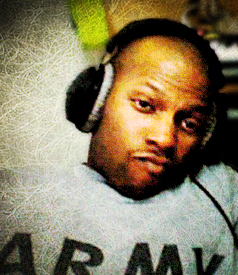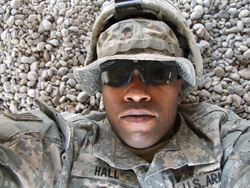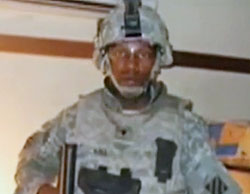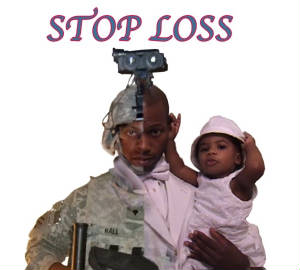War objector with PTSD jailed and ‘extradited’ to Kuwait for secret trial
Donate to help defend Marc - 86 people have given $2,686 of the $3,600 spent on legal fees so far. Because the Army kidnapped Marc to Kuwait for trial, we will need to raise at least $10,000 to provide a civilian defense lawyer. Critical expert witnesses to could be another $5,000. And all of this has to happen within a few weeks.
After filing an official complaint over inadequate mental health services at Ft. Stewart, Georgia, Army Spc Marc Hall was jailed on December 12, 2009 on the pretext of an angry song about “Stop-loss” he produced in July 2009. The Army has recently shipped Spc Hall to Kuwait where he remains jailed awaiting a virtually secret trial.
By Army Spc Marc Hall. February 20, 1010
I never thought that I would join the Army only to one day be incarcerated by the Army. I have never been to jail in my life, until now. The Army is charging me with Article 134 of the Uniform Code of Military Justice, “communicating threats” towards my chain of command. Yet I was only communicating how I felt about what I have experienced in the Army and how I felt about the Army’s “Stop-loss” policy. That policy meant that I could not leave the Army when I was supposed to, and after I had already served in Iraq for 14 months.
I guess this all started with a hard core “rap” song I made about the Army’s very unpopular “Stop-loss” policy back in July 2009. Like any “rap” or rock song, I was expressing my freedom of expression under the US Constitution. Being that the Army’s “Stop-loss” policy was a Pentagon decision from what I had heard on the news, I decided to send a copy of my song directly to the Pentagon.
I don’t know if anyone at the Pentagon listened to my song, but somebody in Washington DC mailed the package back to my chain of command. My First Sergeant called me into his office to discuss it. I explained that the rap was a freedom of expression thing. It was not a physical threat, nor any kind of threat whatsoever. I explained that it was just hip hop. He told me that he kind of liked the song, that it sounded good.
1st Sgt Chrysler and Capt Cross, our company commander at B-CO 2-7 IN [Bravo Company, 2nd Battalion, 7th Infantry Regiment] at that time, just recommended me for mental counseling and evaluation. I attended mental counseling at the behavioral health clinic on Ft. Stewart from late July 2009 through November 2009. I had about four visits to the clinic, but I couldn’t attend all the appointments because we were always training in the field. In the end this counseling still left me feeling the same way about Army life, “stop-loss” and war in general.
I spoke to our chaplain and told him my feelings, including all of the domestic things I had gone through with my estranged spouse and my three-year-old daughter over the last four years. I let him hear the “Stop-loss” song and I explained that he shouldn’t take anything in the song personally. He said he liked the song but wished it was not “gangster”.
Later, when we trained in the field in Georgia and at the National Training Center (NTC) in California, I was made to train without a weapon due to the song and my ongoing counseling. However, during that time of training without a weapon I felt a surprising sense of peace for the first time.
At NTC, in October 2009, I spoke again to our chaplain after attending services one night. I explained to him how I still felt hurt by the Army policies. He replied that my chain of command had already “forgiven” me about the song. But that didn’t really help me with what I was going through and trying to deal with.
After we came back from NTC, in November 2009, I got to go on leave. I thought maybe two weeks leave would do me some good. But during my leave, from November 21 to December 7, a deep depression sunk into me. I just wanted to be alone. I did not want to be around people. I stayed at home alone. My friends and family were worried that I had turned my phone off. I did not feel like talking to people. I barely made it to my mother’s house for Thanksgiving. I thought about all the depressing things that brought me to this state of mind. I thought about how it all pertained to war. I thought about the times I spoke to the chaplain at basic training at Ft. Knox, and the legal assistant at Ft. Stewart, about my divorce and the safety of my daughter and my rights as a father, and how neither of them could help me. I thought about “Stop-loss” more and more. I started drinking hard every day to help me forget the hurt and pain I was feeling. I thought about how war brought me to this war, and the war I would have to face to remove myself from the presence of war in order to keep my sanity.
When I returned to Ft. Stewart, on December 7, 2009, I really felt from that point on that I did not belong there. I realized that I was not fit for war anymore. I was burnt out and war was the cause of it. I was feeling a little unstable and shaky and I didn’t know what to do about it. The very thought of holding and being around a loaded weapon again gave me the chills. I did not know who my enemies were anymore.
About a week later I spoke to my commanding officer, Captain Wynn of F-CO BSB, about how I am still feeling. I explained to him that I felt a little unstable, angry and depressed about war and how unfit I was for war. I said I did not want to get anybody hurt in this war—being that my battle buddies might have to depend on me. I did not want to be a misfortune to anybody. I explained that I had made an official I.G. complaint (with the Army Investigator General) about the treatment I felt I had not received from my last visit to behavioral health, and the unfair treatment and words that came from my direct NCOs. Behavioral health just rushed me out the door and left all decisions up to my chain of command to decide if I was fit or not.
I know my behavior health treatments were pushed aside so that 2-7 IN could have more bodies for this deployment. I believe that this was not fair to me, and it’s not fair to my battle buddies to put a troubled solder on the battlefield knowing that I still have issues.
Capt. Wynn got me in to speak to the Lt. Colonel about my mental state. I tried to explain about the indirect way I might hurt other soldiers in uniform due to how I was burnt out. But he took it as a threat, basically read me my rights, and put me in the Liberty County Jail in Hinesville, Georgia.
I realize now how going to war can bring unwanted results. Now I sit in jail at the hands and mercy of our US Government vs. little old Marc A. Hall on a charge that was not a threat before, but all of a sudden became a threat now. I communicated an extended need for mental evaluation—not a threat.
The negative sworn statements used to jail me are false. One of the Soldiers who wrote a negative statement told me that same day that he did so because he thought it was a way to “help me out” as he knew what I was going through. Another Soldier who wrote a statement said that I was “his hero” because I stood up for what I believed. These negative statements were also the results of jokes that my battle buddies said about me—and I had played along with them at the time when the jokes were presented—while passing long boring hours at the NTC in California. I do appreciate the “help” guys, but the Army is now saying that talk were real threats, and now they have me in confinement awaiting court martial.
I have to say that I have never been so humiliated in my entire life. I’m in jail with and next to people who have committed real crimes, including murder. And I’m in here for trying to get real treatment, voicing my feelings, and for asserting freedom of expression through my art.
Sincerely,
Marc A Hall







